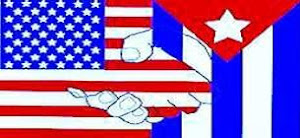The definition of tantalize means to “arouse expectations
that are repeatedly disappointed”. The current state of U.S. Cuba relations at this moment
can best be summed up that way, “tantalizing.” It is a precarious situation for both nations as
expectations need to be managed instead of aroused. Right now the U.S. Cuba arousal is high. Prepare for reality. Many Americans
believe Cuba is wide open for business when still it is not. The business bandwidth and deal flow
for Americans are still too narrow.
Americans want to sell to Cuba.
Cuba wants Americans to invest in Cuba. Therein lies the crux of the challenge. On the American side, the Embargo still
hobbles and blocks this proposition. On the Cuban side, Cuban economic and investment policies
still must be modernized to attract the kind of investment that will eventually
come to Cuba and rebuild and restore it. Selling and investing are functionally co-dependent
economic fundamentals. Before we are going to be able to sell anything to Cuba,
they have to be able to have the resources to buy the goods and services we
want to sell them. That is why
until the obstacles are completely removed, the maximum potential of the
relationship is only mesmerizing at the moment. There are six obstacles remaining to fully normalized and
trade relations:
1) The Cuban Trade Embargo
2) Radio TV Marti and Democracy Program Funding
3) Regime Change Foreign Policy
4) Resolution of Claims
5) Guantanamo Naval Base
6) U.S. Travel Restrictions
Beyond the immediate sectors of travel, food/agricultural, health
and some telecommunications, the opportunities for business are still
limited. The private sector openings in Cuba are real but also very limited. They are limited by the
Obama Administration who has not expanded the opening even further while they
still can. They are also limited
by Cuba’s response of trying to maintain a cautious methodical approach to the
new relationship in the face of overwhelming enthusiasm by both the American
and Cuban people. While President Obama’s initiatives and regulatory openings
are significant, there are still neither substantial nor transcendent. Transformation requires boldness and risk taking. With the time remaining in the Obama
Administration, there should be more proactive steps taken to expand the
opening and facilitate the opening.
For example, while Cuba was removed from the Terror List, the regulatory
impediments that make it possible for them to use U.S. Dollars in the
international banking system remain in place. This means the rationale for the infuriating 10 percent
surcharge on U.S. dollar exchanges imposed in 2003 remain in place. Who is paying that? Americans and anyone who wants to give
up the first ten cents of every U.S. dollar they have when it comes to spending
in Cuba. It is disingenuous that
we have a real meaningful travel opening when we still put up an onerous cost
that easily could be removed by our side.
We have also not divorced ourselves from the notion that we are going to
somehow decide or how to conduct Cuba’s political future for the Cubans. We are not. That does not mean that Cuba will change. It will. On its own timetable however, not ours. That is the root of
the distrust between our two countries and the guarantee for our ultimate
disappointment. The best we can
accomplish is being a good neighbor and engage in a respectful debate and
dialogue.
Similarly Cuba faces its own tantalization by America. They want our goods, our services, and our
people to visit and collaborate with them. They need us if they are going to meet their economic growth
targets. However, Cuba faces its
own existential challenges with 10 percent of its people and their descendants
living 90 miles away from the island and another 10 percent living elsewhere
abroad. This alters the notion of
Cuban identity. How will they keep the values
they cherish in the face of a reconciliation with their neighbor to the
north? How do they perfect their
socialism with capitalism? The
Cuba before normalization will not be the same Cuba after normalization
completes. What is each side afraid of? Those are the elephants in the room.
The road ahead for businessmen and corporations to do real business
will require authentic relationship building with visits in both
countries; establishing a meaningful presence; and negotiating deals that create mutually beneficial
business transactions that focus on profit and social benefit. If you want to do business in Cuba, you need to get in the business of getting rid of the travel restrictions and trade embargo. That means lobbying at home. With the plethora of consultants and
lawyers with Havana dealing on their minds, also remember something a Cuban official
stated, “There are those who have come here after December 17, 2014 and those
who have come here before. We know them.”
Create your Cuba business map and plan beyond tantalization to discover
the real opportunities.










0 Comments:
Post a Comment